《新编英语教程 2 教师用书》
| 作者 | 李观仪主编 编者 |
|---|---|
| 出版 | 上海:上海外语教育出版社 |
| 参考页数 | 269 |
| 出版时间 | 1986(求助前请核对) 目录预览 |
| ISBN号 | 7218·220 — 求助条款 |
| PDF编号 | 810703778(仅供预览,未存储实际文件) |
| 求助格式 | 扫描PDF(若分多册发行,每次仅能受理1册) |
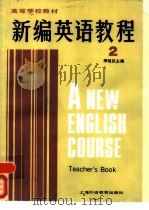
MAIN TEACHING POINTS1
Unit11
A Flying Saucer2
An Unusual Woman3
Weather Forecasting4
An American Sightseeing in Athens5
Telephone Calls6
Pigeons7
Challenges8
1.The present perfect progressive indicating a finished action9
2.The past progressive indicating a circumstance and the simple past indicating an event3.The past perfect progressive4.The I was wondering if...pattern as a polite form of requestLISTENING COMPREHENSION9
Language Without Words9
Computers10
Announcements11
The Present12
MAIN TEACHING POINTS13
Unit213
Messages from the Media13
On the Train14
The Secret of Long Life15
The Million-Pound Banknote16
Don't Forget to Remember!17
The World of Helen Keller18
2.the subject complement introduced a by wh-word20
1.the subject complement introduced by that20
The nominal clause used as20
3.the appositive20
4.the subject introduced by what20
LISTENING COMPREHENSION20
MAIN TEACHING POINTS23
Unit323
LISTENING COMPREHENSION30
The passive sentence30
1.involving the modal auxiliary have to30
2.converted from the active sentence with a direct and an indirect object30
3.involving the verb phrase/phrasal verb30
4.formed by the They say/It is said patterns30
MAIN TEACHING POINTS33
Unit433
5.can/could not+perfect infinitive used to express'negative deduction about past actions'6.must+perfect infinitive used to express'affirmative deduction about past actions'7.may/might as well used with the second person pronoun expressing'suggestion41
4.may/might+perfect infinitive used to express'speculations about past actions'41
Modal auxiliaries41
1.would+perfect infinitive used to express'unfulfilled wish'41
2.should/ought to+perfect infinitive used to express'unfulfilled obligation'41
3.needn't+perfect infinitive expressing'unnecessary past actions'41
MAIN TEACHING POINTS45
Unit545
LISTENING COMPREHENSION51
Indirect speech introduced by51
1.a simple past verb reporting a command51
2.a simple past verb reporting advice51
3.a simple present verb reporting a request51
4.a simple present verb reporting a reminder51
5.a simple present verb reporting a question51
Unit655
MAIN TEACHING POINTS55
3.of concession introduced by no matter+wh-word/even if62
The adverbial clause62
4.of comparison introduced by than62
5.of comparison in the the more...the more...pattern62
LISTENING COMPREHENSION62
2.of result introduced by so...that62
1.of purpose introduced by so that62
Unit766
MAIN TEACHING POINTS66
1.The-ing participle used as the object of remember,forget and stop73
The infinitive used as the object of remember,forget and stop73
2.The infinitive used as a noun modifier preceded by for and its logical subject3.The infinitive used as the postponed object in the introductory it construction4.The-ing participle used as the object of a prepositionLISTENING COMPREHENSION73
MAIN TEACHING POINTS76
Unit876
5.Expressing increase by using times83
LISTENING COMPREHENSION83
4.The relative clause introduced by why83
3.The relative clause preceded by the way(in which)83
2.The relative clause introduced by where83
1.The relative clause introduced by when83
MAIN TEACHING POINTS85
Unit985
3.Sentences of unreal conditions related to the future90
LISTENING COMPREHENSION90
1.The subjunctive were after I wish,indicating a present non-fact90
2.The subjunctive had been after I wish,indicating a past non-fact90
MAIN TEACHING POINTS93
Unit1093
LISTENING COMPREHENSION100
3.The past perfect used in the hardly...when...pattern100
1.The future expressed by be about to100
2.be going to in the past expressing'an implied intention'100
5.The simple past in the It's time+subject+past-tense verb pattern100
4.The past perfect of hope+infinitive expressing'an unfulfilled wish'100
Unit11103
MAIN TEACHING POINTS103
5.the postponed object in the introductory it construction110
LISTENING COMPREHENSION110
4.the object,in the It all depends on+wh-word pattern110
3.the subject,introduced by It doesn't matter+wh-word110
2.the subject,introduced by It happens that110
1.the subject,introduced by It seems that110
The nominal clause used as110
Unit12114
MAIN TEACHING POINTS114
The passive sentence120
1.converted from an active sentence containing the make somebody do something pattern2.formed by get+-ed participle3.with a past perfect modal auxiliary4.converted from an active sentence containing the know/think somebody to be pattern5.converted120
MAIN TEACHING POINTS123
Unit13123
2.used to expressing'a past action/situation which is no longer done/no longer exists'3.daren't expressing'lack of courage'4.should in the introductory it construction5.should used after certain verbsLISTENING COMPREHENSION132
1.ought to used to express'strong probability'132
Modal auxiliaries132
Unit14134
MAIN TEACHING POINT134
Indirect speech introduced by various kinds of reporting words142
LISTENING COMPREHENSION142
Unit15145
MAIN TEACHING POINTS145
LISTENING COMPREHENSION153
of alternative condition introduced by whether...or not153
5.of degree introduced by so far as153
4.of manner introduced by as if/as though,indicating unreal situations153
of time/condition introduced by so long as/as long as153
of time/cause introduced by now that153
3.of concession introduced by however153
2.of time and place introduced by whenever and wherever153
1.of time introduced by while/as soon as/the moment/by the time153
The adverbial clause153
Unit16157
MAIN TEACHING POINTS157
1.The -ed participle used as the object complement in the have something done pattern157
1.The -ed participle used as the object complement in the have something done pattern157
1.The -ed participle used as the object complement in the have something done pattern157
4.The -ing participle used as the postponed object in the introductory it construction157
2.The infinitive that takes a logical object,which is the subject of the sentence164
3.The -ing participle used as the object of the preposition164
5.The -ing participle used as the object complement164
4.The -ing participle used as the postponed object in the introductory it constructionLISTENING COMPREHENSION164
MAIN TEACHING POINTS167
Unit17167
1.The relative clause introduced by pronoun+of+which175
2.The relative clause introduced by who/that and preceded by another relative clause3.The relative clause introduced by that and containing there be4.The relative clause introduced by which,its antecedent being the main clauseLISTENING COMPREHENSION175
Unit18180
MAIN TEACHING POINTS180
Sentences of unreal conditions186
1.related to something being done at present186
2.with the connective unless186
3.with the connective supposing186
4.with the connective otherwise186
5.in the if it hadn't been for...pattern186
LISTENING COMPREHENSION186
Visiting the Taj Mahal189
A Sample Test189
Answers and Tapescript for the Sample Test198
Key to the Workbook205
1986《新编英语教程 2 教师用书》由于是年代较久的资料都绝版了,几乎不可能购买到实物。如果大家为了学习确实需要,可向博主求助其电子版PDF文件(由李观仪主编 1986 上海:上海外语教育出版社 出版的版本) 。对合法合规的求助,我会当即受理并将下载地址发送给你。
高度相关资料
-
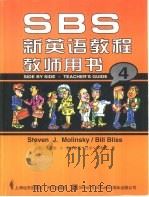
- SBS新英语教程 教师用书 4
- 1998 上海:上海远东出版社;北京:外文出版社;西蒙与舒斯特国际出版公司
-

- 新编大学英语 教师用书 2
- 1999
-

- 新编英语教程4 教师用书
- 1987
-

- 新编英语语法教程 教师用书:英文
- 1995.06 上海外语教育出版社
-
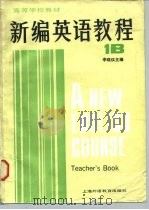
- 高等学校教材 新编英语教程 英语专业用 1B 教师用书
- 1986年04月第1版 上海外语教育出版社
-
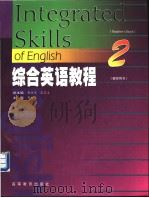
- 综合英语教程·教师用书·2
- 1999 北京:高等教育出版社
-
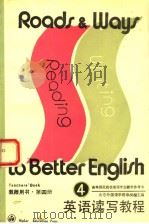
- 英语读写教程 教师用书
- 1990 高等教育出版社
-
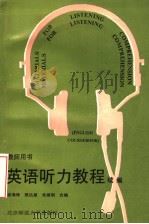
- 英语听力教程 续编 教师用书 英文
- 1993 北京:北京师范大学出版社
-
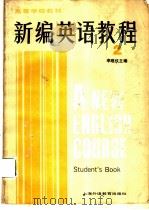
- 新编英语教程 2 学生用书
- 1986 上海:上海外语教育出版社
-
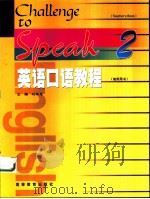
- 英语口语教程 教师用书 2
- 1999 北京:高等教育出版社
-
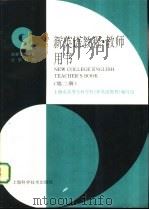
- 新英语教程 教师用书 第2册
- 1996 上海:上海科学技术出版社
-

- 新编一千零一夜-童话·寓言·故事 上
- 1991 北京:北京科学技术出版社
-
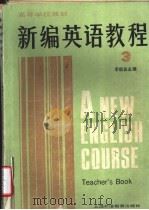
- 新编英语教程 3 教师用书
- 1987 上海:上海外语教育出版社
-
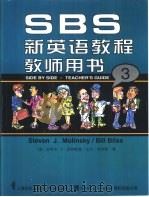
- SBS新英语教程 教师用书 3
- 1998 上海远东出版社;北京:外文出版社;西蒙与舒斯特国际出版公司
-
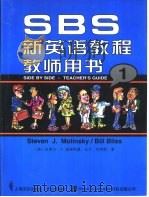
- SBS新英语教程 教师用书 1
- 1998 上海:上海远东出版社;北京:外文出版社;西蒙与舒斯特国际出版公司
提示:百度云已更名为百度网盘(百度盘),天翼云盘、微盘下载地址……暂未提供。➥ PDF文字可复制化或转WORD